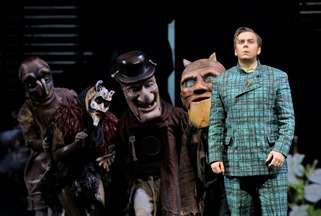|
Back
A Homage to F.W. Murnau Chicago
Lyric Opera
03/03/2018 - & March 6, 9, 12, 15*, 18, 21, 2018
Charles Gounod : Faust
Ailyn Pérez*/Ana María Martínez (Marguerite), Benjamin Bernheim (Faust), Christian Van Horn (Méphistophélès), Annie Rosen (Siebel), Edward Parks (Valentin), Jill Grove (Marthe), Emmett O’Hanlon (Wagner)
Lyric Opera of Chicago Chorus, Michael Black (Chorus Master), Lyric Opera of Chicago Orchestra, Emmanuel Villaume (Conductor)
Kevin Newbury (Director), John Frame (Production Designer), Vita Tzykun (Set and Costumes Designer), Duane Schuler (Lighting)

(© Cory Weaver)
It’s hard to believe that Faust used to be one the most popular operas in the repertoire. It never went out of favour, but it is no longer frequently performed. The reason is neither the rarity of the voices required nor the difficulty in its staging. More likely, the reason is that, as conceived by Gounod and his librettists, it betrays the spirit of Goethe’s masterpiece and evokes more the bourgeois values of Napoleon III’s decadent Second French Empire. If done conventionally, it is too bourgeois and too Catholic, and is likely to bore the audience. Directors try to invent twists to replace banality with excitement. Stage director Kevin Newbury chose a cinematic inspiration. The influence of F.W. Murnau’s 1926 silent film Faust, Wegener’s 1920 Golem and other expressionistic films is evident. Video projections of ghouls, skeletons and other stylized monsters were used throughout the opera. At times, they were effective but often distracted. Likewise, Mephistopheles was at times accompanied by gnome-like creatures that were mostly superfluous and even annoying.
The three lead singers were exceptional. Young French tenor Benjamin Bernheim was the revelation of the evening. He has a beautiful lyric tenor voice, ease in the upper register and sings in French with the proper diction and conviction. His “Salut! Demeure chaste et pure” was a delight. However, he was not helped by Vita Tzykun’s odd choice of costumes. Prior to his transformation to a young man, the old Faust did not look convincingly old. Once transformed into a young man, his costume was an ugly green suit two sizes too big. Given the time of year the opera was given, might it have been a wicked Saint Patrick’s Day homage? The effect was quite sad, especially that Bernheim’s stage presence is not his strongest asset. Chicago native Ailyn Pérez’s lyric soprano voice was well suited for Marguerite. Her diction in French was good. Her Jewel Song, “Ah, je ris de me voir,” was vocally brilliant and her Spinning Wheel Song, “Il ne revient pas,” was moving. But it was an outrage to have Mephistopheles’ creatures on stage throughout the Jewel Song. Director Newbury had the odd idea of portraying Marguerite as physically disabled. Perhaps the effect was to evoke more pathos. This is totally unnecessary as there is enough pathos in the music and in the role. Having Marguerite with a crutch is distracting. Moreover, her attire was drab throughout the opera; a small detail, but these things can make a difference. Bass-baritone Christian Van Horn was given the best costume as Mephistopheles. Though his bass-baritone voice is somewhat light for the role, he managed to convince thanks to his excellent stage presence and acting abilities. His first act aria, “Le veau d’or est toujours debout,” was unspectacular, but his ironic “Vous qui faites l’endormie” was well done in all respects.
Sadly, the supporting cast was not as effective in their roles as were the three leading roles. Mezzo Annie Rosen was convincingly timid as Siebel. Her aria “Faites-lui mes aveux” was touching. Edward Parks was a weak Valentin, vocally inadequate and stylistically non-Gallic. His “Avant de quitter ces lieux” was sadly forgettable. Jill Grove provided comic relief as Dame Marthe, despite a non-idiomatic diction in French. The chorus was well rehearsed, though Newbury’s placing of the chorus during “Ainsi que la brise légère” was far from festive. Likewise, the Soldiers’ chorus, “Gloire immortelle de nos aïeux,” with nearly all soldiers mimed and accompanied by a film projection of grotesque cartoons, was more of a war protest song. The Act 5 ballet was cut, perhaps mercifully, given Newbury’s fondness for gnomes. I have only praise for French conductor Emmanuel Villaume, who directed the orchestra with style and vigour, revealing the wondrous lyricism of Gounod’s music.
Ossama el Naggar
|